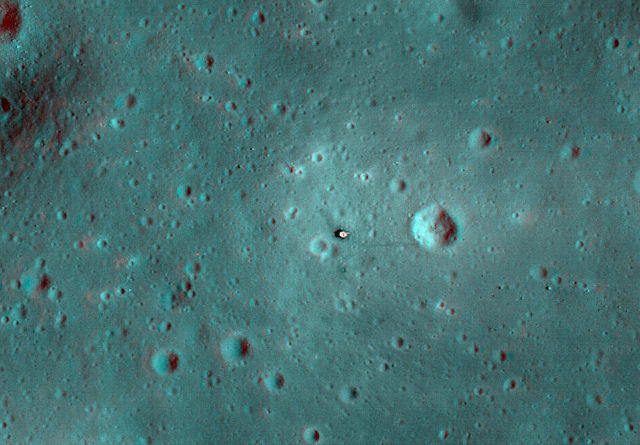[/caption]
With the
Lunar Reconnaissance Orbiter Camera
constantly snapping images of the lunar surface, we have been able to see most of the Apollo landing sites with better and better detail. Image editing wizard Nathanial Burton-Bradford has now "3-D-ified" all the landing sites except Apollo 16, and by viewing these images with 3-D glasses (the ones with red and cyan lenses) the lunar landers are easily visible and really stand out. Other features such as tracks and experiments left by the Apollo astronauts become more visible as well. See more images below, and click on the images for larger versions, or see
Nathanial's Flickr page
for more!
[caption id="attachment_82033" align="aligncenter" width="543" caption="The Apollo 12 landing site. Credit: NASA/GSFC/Arizona State University, 3-D by Nathanian Burton-Bradford"]
[/caption]
[caption id="attachment_82036" align="aligncenter" width="580" caption="Apollo 14 landing site. Credit: NASA/GSFC/Arizona State University, 3-D by Nathanial Burton-Bradford."]
[/caption]
[caption id="attachment_82037" align="aligncenter" width="576" caption="Apollo 15 landing site. Credit: NASA/GSFC/Arizona State University, 3-D by Nathanial Burton-Bradford."]
[/caption]
[caption id="attachment_82039" align="aligncenter" width="543" caption="Apollo 17 landing site. Credit: NASA/GSFC/Arizona State University, 3-D by Nathanial Burton-Bradford"]
[/caption]
And for good measure, here's one of the impact crater created by the Apollo 17 Saturn booster.
[caption id="attachment_82034" align="aligncenter" width="524" caption="The crater made by the Apollo 17 booster. Credit: NASA/GSFC/Arizona State University, 3-D by Nathanial Burton-Bradford."]
[/caption]
 Universe Today
Universe Today
